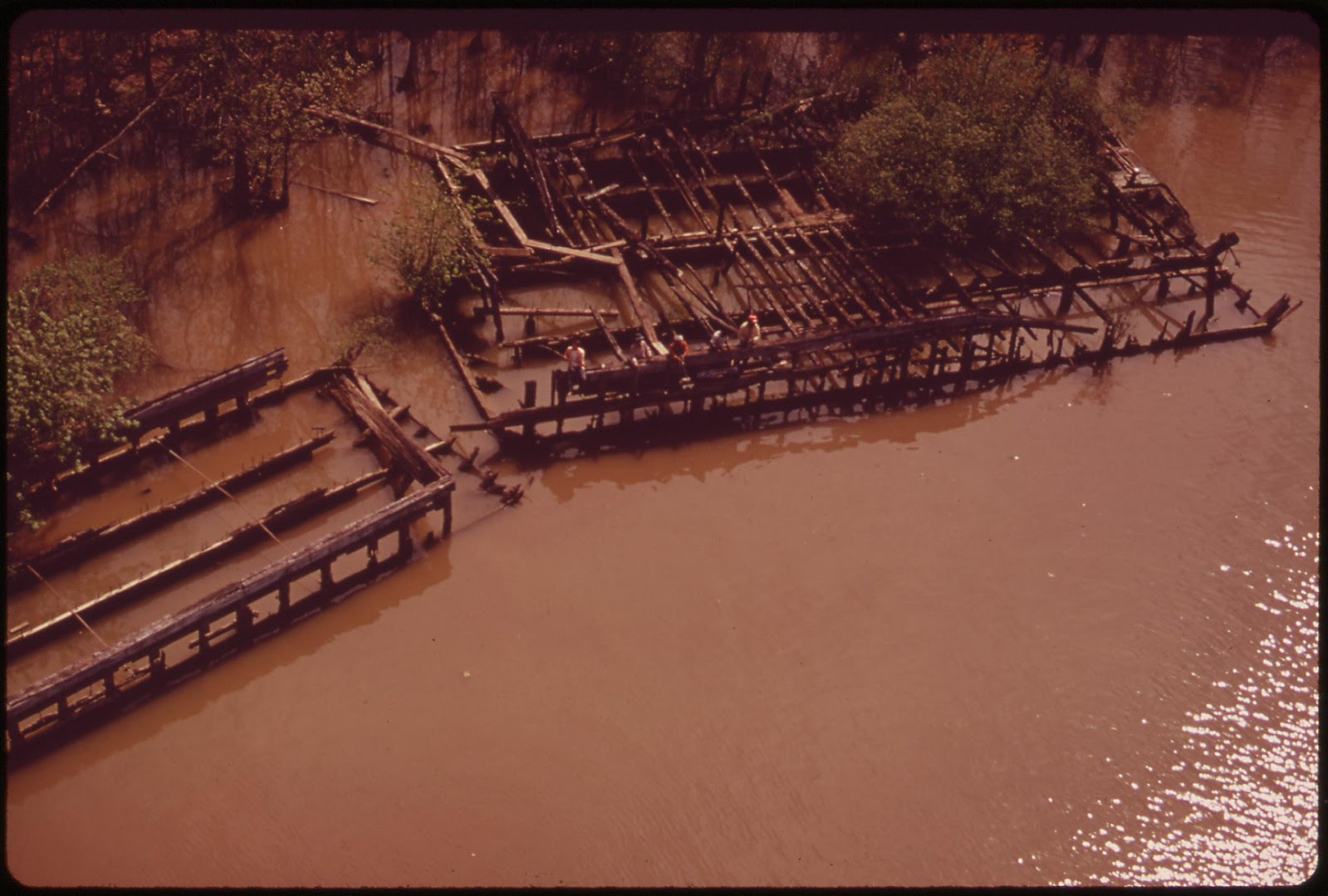.

Sunset on the polluted Potomac: photo by John Neubauer for the Environmental Protection Agency's DOCUMERICA project, September 1972 (U.S. National Archives)
By broad Potomac's shore -- again old tongue!
(Still uttering -- still ejaculating -- canst never cease this babble?)
Again, old heart so gay -- again to you, your sense, the full flush spring returning;
Again the freshness and the odors -- again Virginia's summer sky, pellucid blue and silver,
Again the forenoon purple of the hills,
Again the deathless grass, so noiseless soft and green,
Again the blood-red roses blooming.
Perfume this book of mine O blood-red roses!
Lave subtly with your waters every line Potomac!
Give me of you, O spring, before I close, to put between its pages!
O forenoon purple of the hills, before I close, of you!
O smiling earth -- O summer sun, give me of you!
O deathless grass, of you!
Walt Whitman (1819-1892): By Broad Potomac's Shore, from Leaves of Grass (fifth edition, 1871)

Fishing the polluted Potomac for catfish: photo by John Neubauer for the Environmental Protection Agency's DOCUMERICA project, April 1973 (U.S. National Archives)


Fishing the muddied Potomac near Mt. Vernon: photo by John Neubauer for the Environmental Protection Agency's DOCUMERICA project, April 1973 (U.S. National Archives)

A small power boat makes a U-turn on the Potomac just above Mt. Vernon: photo by John Neubauer for the Environmental Protection Agency's DOCUMERICA project, April 1973 (U.S. National Archives)

A small power boat on the Potomac River above Mt. Vernon churns up silt: photo by John Neubauer for the Environmental Protection Agency's DOCUMERICA project, April 1973 (U.S. National Archives)

A small power boat on the Potomac River above Mt. Vernon stirs up silt: photo by John Neubauer for the Environmental Protection Agency's DOCUMERICA project, April 1973 (U.S. National Archives)

Power boats on the polluted Potomac: photo by John Neubauer for the Environmental Protection Agency's DOCUMERICA project, September 1972 (U.S. National Archives)

Sunset on the polluted Potomac: photo by John Neubauer for the Environmental Protection Agency's DOCUMERICA project, September 1972 (U.S. National Archives)

Raw sewage flows into the Potomac at Georgetown Gap. The Watergate complex and the Kennedy Center for the Performing Arts are nearby: photo by John Neubauer for the Environmental Protection Agency's DOCUMERICA project, April 1973 (U.S. National Archives)

Raw sewage flows into the Potomac at Georgetown Gap. Watergate complex in the background: photo by John Neubauer for the Environmental Protection Agency's DOCUMERICA project, April 1973 (U.S. National Archives)



5 comments:
I think the Potomac has improved in recent decades, but the point is still well made and well taken TC
Michael,
Thanks very much. Whitman is always helpful to come back to. The borderline of self parody is as near here as ever, and yet the dignity of carriage embarrasses what passes for poetry now.
It's been a cold shut-in springtime here, and perhaps that's made Walt's evocation of his Virginia springtime so effective in this re-reading.
The poem comes out of his return to Washington after the war. There were family sorrows. Not a happy time for him. Then in 1865 a friend -- William Douglas O'Connor, poet, printer and editor -- approached the Secretary of the Interior on his behalf. As a result Walt was hired to a low-grade clerical job in the Bureau of Indian Affairs. Six months later a new Secretary fired him, possibly on "moral" grounds. O'Connor protested, and Whitman was transferred to the office of the Attorney General, where he stayed on until 1872.
This poem seems to remember the war, and also seems to have an everyday element, the observations of place made by someone who experienced the place in that common way of someone walking to and from work.
He would not have seen raw sewage flowing into the Potomac at Georgetown Gap, of course, nor passed by the Watergate complex, along that daily route.
I'm always stunned anew that this EPA program documented the deterioration of the American environment, in that epoch, so accurately -- and in many cases so prophetically..
Government does not now do such stuff.
About the Potomac -
Maryland Public Television has a recent documentary about the river, enjoyable and informative - a quick search does not find a way to view it online, and the DVD is available at "donation level" cost - i.e. $60 - but this may change - I am in Montgomery County, Maryland and hope it will be in our public library at some point
https://www.youtube.com/watch?v=H487o1tYg00
Government does not now do such stuff.
Alas. I was born in one Commonwealth (Massachusetts) and received much of my education in another (Virginia). The concept, as well as the implications of the word "citizen", may be revived one day, but right now it seems the trend is in the other direction.
So there we were, at the height of the Cold War, in the capital, the very heart, of a world-dominating super-potencia, and we literally couldn’t get our shit together. One wonders if Moscow displayed a similar neglect and disregard for the welfare of its subjects living along the Moskova.
Hazen, Yes, it's wonderful how insightful Burckhardt was, when he pointed out that the cultural level of any historical empire could be determined by its arrangements for Waste Management.
You'll perhaps recall our earlier picnic outings to that great scenic hazardous waste capital just a little way up the gloriously polluted seaboard.
Wil Blanche: Memorial / City of Garbage, 1973
Arthur Tress: City of Ashes ("Ashamed of my eyes that behold it")
I'm convinced Nixon signed off on this EPA environmental-documentary project only because of the "secret" but really not-so-secret B-52 bombing campaigns then going on in Cambodia and Laos, Hank Kissinger's pet projects of mass destruction of human life -- er, that is, interdiction of enemy supply routes.
One B-52 raid over Laos probably cost more than any given Documerica photo shoot, and if the latter project had its drawbacks public-policy-wise -- exposing the landfill and cesspool dumps our cities had become -- it was probably intended to distract attention from the former.
Not that anyone was paying all that much attention to the bombing, anyway, save maybe a few dispensable unpatriotic types here -- and of course those faraway "foreign" unfortunates in the general area of the targeted sites, who had learned to flinch, duck, and scrabble their way into a shallow pit in the ground in the few moments between bomb-release and impact, in hopes of living another few hours.
They're still flinching, ducking and scrabbling -- and, quite naturally, hating us with a cold blue hatred -- in parts of Laos, where the unexploded bombs still go off every day in the rice fields, murdering children who have never seen Doctor Strangelove...
UXO, like a toxic chemical spill, doesn't just go away
And with bombs as with garbage, it's waste not want not, like they say. Or do they still say that anymore?
It's of course always a growth industry in beautiful America del Norte, waste. Just look at Chris Christie, casa blanca hopeful and appropriately bloated figurehead of possibly the most iconic waste management constituency on the planet.
Tony: "I'm in the waste management business"
Sopranos: Garbage truck scene
Sopranos: Waste Management Sit-Down
Post a Comment